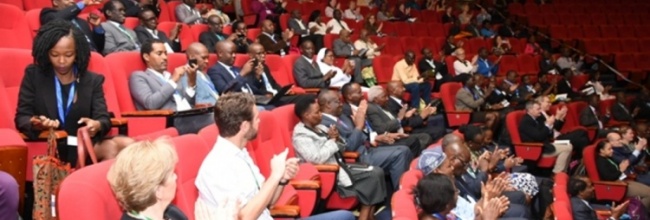The University of Nairobi (UoN) through the Kenya AIDS Vaccine Institute (KAVI-Institute of Clinical Research) has received a grant of Kshs. 110 million to conduct a study – “Global Health Research on Prevention and Management of Stillbirths and Neonatal Deaths in Sub-Saharan Africa and South Asia” under the KAVI-ICR’s non-communicable diseases research track.
KAVI- ICR is part of a consortium that was awarded the by the National Institute of Health Research of the United Kingdom.
The University of Nairobi is working under a collaborative agreement with 13 other institutions globally with the principal investigator being Prof. Dame Tina Lavender from Liverpool School of Tropical Medicine and Prof. Walter Jaoko Director of Kenya AIDS Vaccine Institute (KAVI) being the co-investigator. The programme is the largest that has ever been conducted in regards to still-births and fistula and it has received recognition from the World Health Organization (WHO).
While paying a courtesy call on the UoN Vice-chancellor, Prof. Stephen Kiama, Prof. Lavender noted with excitement the positive impact that the programme has had in the acceleration of progress in preventing – stillbirth and by improving bereavement support for the affected parents.
“As a taboo topic across Africa, the programme has made important strides towards raising the profile of stillbirth across Africa, to build capacity for medical workers to train about the prevention of fistula and create awareness on these sensitive issues in the society,” she revealed.
Prof. Kiama said that the University will fully support the programme activities.
“I look forward to the results which further reduce still-births and fistula to create awareness and help sensitize the society on these issues,” he said.
In her remarks, Dr. Wakasiaka highlighted some of the activites the team has been engaging in prevent fistula in the country.
“We have created the policy framework for preventing obstetric fistula in Kenya which has aided counties such as Nyeri and Kisii to implement and localize policies which would be suitable for the specific ethnolinguistic of the counties due to the cultural diversity in Kenya,” she noted. “This will go a long way to ensure that the society is empowered to handle this issue without stigmatizing the affected individuals.”
Prof. Lavender was accompanied by Dr. Tracey Mills from Liverpool School of Tropical Medicine and Dr. Sabina Wakasiaka – the Regional Coordinator for the stillbirth programme to have discussions about the programme on 1st March 2022.
Read the original article here.

